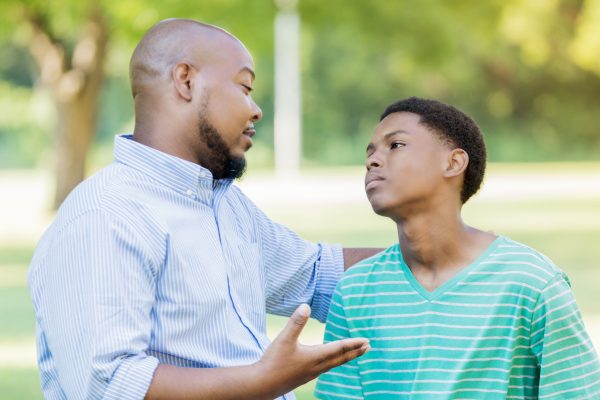 Teen dating violence is no small problem and, sadly, is much more common than many parents believe.
Teen dating violence is no small problem and, sadly, is much more common than many parents believe.
It’s estimated 1 in 3 girls in this country is a victim of physical, emotional or verbal abuse from a dating partner, according to the National Domestic Violence Hotline. Nearly 1.5 million high-school students nationwide experience physical abuse from a dating partner each year.
Teen dating violence is a pattern of a variety of behaviors used to exert power and control over the victim, and can come in the form of verbal, emotional, psychological, physical and sexual abuse. It affects girls and boys across all races and socioeconomic status, and happens in both heterosexual and disproportionally in homosexual relationships.
“Unfortunately, research shows that kids with a history of teen dating violence are at an increased risk of being in an abusive relationship in adulthood,” said Dr. Laura Hlavaty, a pediatric psychologist in Akron Children’s Lois and John Orr Family Behavioral Health Center. “That’s why it’s a good idea to start conversations with your teen now about recognizing and developing healthy relationships so they can carry this skill with them into adulthood.”
As we recognize Teen Dating Violence Awareness this month, Dr. Hlavaty gets to the heart of the matter by discussing how parents can help their children develop healthy romantic relationships and what red flags to look for in unhealthy ones.
Help your teen develop healthy romantic relationships
It’s important to talk to your children about what a healthy relationship looks like even before they start dating to plant the seed for the future. Dr. Hlavaty offers 4 ways to help your teen build healthy romantic relationships as she grows.
Model and discuss healthy romantic relationships.
Believe it or not, your teens are watching and learning from you. That’s why it’s so important to model what a healthy romantic relationship looks like — one that consists of trust, honesty, compassion, compromise and communication.
Then, talk to them about what a healthy one looks like. You can discuss forms of love, what it means to love, and similarities and differences between love and intense feelings. Point out healthy — and unhealthy relationships — in your own life or popular media as concrete examples your teens can relate to.
Help teens build their sense of self-worth.
Point out your teens’ strengths and abilities, and avoid comparisons with other siblings or friends. Have discussions about what your kids value most about themselves and how those values can guide the development of healthy romantic relationships.
Also, teach your teens to be self-compassionate by forgiving themselves and focusing on the good in themselves. When they make mistakes, encourage your teens to embrace those mistakes to learn from them and promote growth.

Keep an open and understanding dialogue with your child. The key is helping your child come to his own conclusions.
Give teens a safe space to talk.
Create a safe zone in your home for teens to feel comfortable sharing with you anything that’s on their minds. Being a safe base for teens means learning how to recognize, hold and separate your own feelings from your kids’, so that you can respond in an attuned and supportive way.
When answering their questions about a concern, it’s important to be open and honest. It sets the foundation for teens to be comfortable coming to you with new information, whether they got a good grade on a test, have a new crush, wrecked the car, or started engaging in risky behavior.
Talk about consent.
Discuss what consent means and emphasize its importance with your teens. Consent is asking permission to be physically intimate with another person and is a shared decision where two people reach a conclusion together.
Be sure your teens understand they don’t have to partake in any activity they’re not ready for. Remind them that they can have a healthy romantic relationship that doesn’t have to be physically intimate at this stage in their lives.
Teen dating violence warning signs
Common warning signs of a teen dating violence victim:
- Sudden changes in appearance or diet
- Failing grades
- Avoiding friends and family, or withdrawing from social activities
- Unexplained bruises or scratches
- Becoming secretive, or sudden changes in mood or personality
Red flags of an abusive partner:
- Jealousy and possessive behavior
- Controlling or demanding
- Makes false accusations, questions victim’s motives
- Explosive temper, blames victim for arguments or other issues
- Insults victim
- Constantly calls, texts or checks up on victim
What should you do if you notice a red flag?
If you think your teen may be in an unhealthy relationship, keep an open, nonjudgmental and understanding dialogue. If you notice any red flags, encourage your teen to look deeper into them by bouncing questions back to her.
Listen to your teen and refrain from lecturing or making demands. Instead of trying to force her to break it off, you could say, “I’ve noticed some changes in your relationship and your partner’s behavior. Is there something you’d like to talk to me about?”
“The key is helping your teen come to her own conclusions,” said Dr. Hlavaty. “If you try to force the situation, research has shown the victim is more likely to stay in the relationship.”
If you’re struggling to support your child, Akron Children’s Adolescent Medicine physicians can help. Call 330-543-8538 to schedule an appointment. Telehealth appointments are now available.










